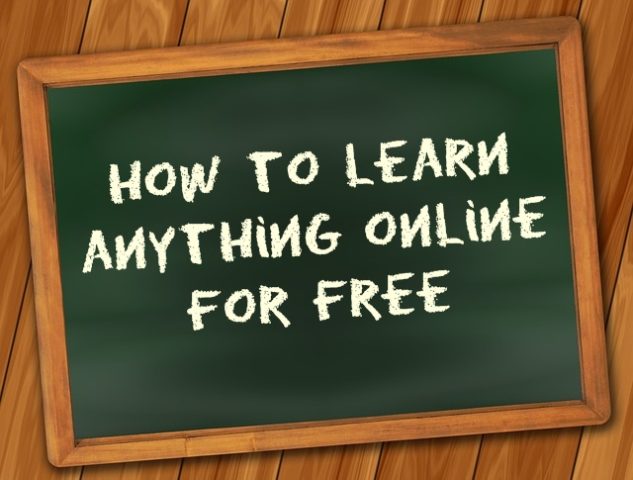How to Learn Anything Online for Free
By Diane de la Cruz
May 10, 2016 • Fact checked by Dumb Little Man

The first thing most people worry about when they want to learn something is money. They think of buying books or enrolling in paid courses. The problem is these books and courses can be expensive. Some of them may be affordable, but perhaps you need the extra cash for something else.
The good news is, in most cases, learning anything doesn’t have to cost you a cent. All you have to do is use Google, right? Yes, but Google is only a gateway to tons of learning resources online. You also need to know how to look for the information you need. Here are some tips to help you find free learning resources. But first you need to …
Know What You Need to Learn First
Before you do your research online, you need to make sure you know what to look for. One way of doing this to take a look at the descriptions, tables of content and indexes of books as well as the outlines of courses relevant to the skill or subject that you’re trying to learn. These will give you a lot of clues on what you need to study.
You’ll find the For Dummies website very useful if you want to find out the basic information that you should know. As you probably know, For Dummies books teach the basics of anything under the sun. If you can’t spare a dime to invest in one of these books, you can simply look for a book related to whatever it is you’re trying to study. Look for the “Description” and “Table of Contents” tabs.
You can also look for relevant books on Amazon and use their Look Inside feature. This feature also allows you to see the table of contents and the indexes of books.
Google is Your Friend
As you know, Google can help you find tons of information online about all topics imaginable. But you must learn how to use search strings if you want to find good sources of information online. A search string is a combination of keywords and symbols that help you find information more efficiently and accurately on a search engine.
Here are a few search strings you can immediately use to help you find what you need:
- site:[URL]
e.g. site:wikipedia.org
This search string returns results on a particular website only. It excludes any other website. Make sure there isn’t a space between the URL of the site and the colon. - site:[domain extension]
e.g. site:.edu
A domain extension is the last few letters of a URL after the dot used to classify the domain or identify a location. Common examples are .com, .net, .org, .gov, and .edu. In this example, Google will only display .edu websites. These are websites are typically owned by educational institutions which are sources of authoritative information. - filetype:pdf [relevant keyword phrase]
e.g. filetype:pdf “global warming”
This search string will allow you to find documents on the subject that you’re trying to learn. Oftentimes, you will come across whitepapers, free reports, and e-books that contain valuable information. If you want to find documents on a particular website, simply type the example in the search bar: filetype:pdf “global warming” Aside from pdf, you can look for doc, ppt, mp3, mp4, and zip files using the above search string.
YouTube is Your Friend, Too
Tutorial videos, if you want to learn how to do something, but there are also lectures and presentations on the fundamentals of any subject. You can use the filter to find recent videos. I must warn you that many of the tutorials on YouTube are garbage. Again, make sure that you’re learning from authoritative sources.
Sign Up for Free Courses
There are many websites that offer free online courses that you can sign up for. Here are some good ones:
- Udemy – This website offers both free and paid courses on different subjects. To look for free courses, use the filter.
- Coursera – If you want to get some course materials from prestigious learning institutions such as Stanford and MIT, then you should visit this website. You don’t have to pay a cent to learn, but if you want a certificate, you have to fork in some cash.
- Alison – Alison offers free courses with certification. Some of the learning materials here are outdated, but most of them are still good.
- Khan Academy – Khan Academy offers free learning sources for academic subjects such as math, science, and computer programming, to name a few.
Look for Authority Blogs
Blogs are also good sources of information. However, you must make sure that the author is a veritable expert on the subject that you’re trying to learn. The key to find experts is to look for influencers in the niche and then look for their blogs.
Ask Questions
One of the advantages that you can get from paid courses is the chance to have your questions answered. However, there are other ways to find people who can answer your questions. Look for the online watering holes of topic experts. Here are some places where they usually hang out:
- Social media groups
- Online forums
- Quora
You can also participate in the group discussions on websites that offer free courses (see above).
I have listed only a small fraction of free learning resources that are available online. There are a lot more. The point is, when it comes to learning anything online money doesn't have to be an issue.
Diane de la Cruz
Diane de la Cruz is a freelance writer and social media manager who helps business owners attract more leads and customers.



